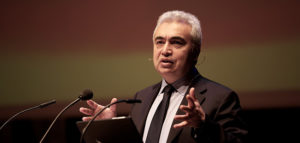
I highlight a report published by the International Energy Agency (IEA) which calls on the government to accelerate investments in clean energy. And invites him to make quick decisions on the future of nuclear power.
It is a painful paradox, put forward by the International Energy Agency (IEA). France has posed as one of the leaders of the energy transition and it is widely seen as a precursor by the international community. In fact, its per capita greenhouse gas emissions are the lowest of the G7 member countries. However, it is behind on its energy transition objectives, although major reforms are underway.
Considerable work
At this stage, France is not in the nails to achieve carbon neutrality in 2050. In 2021, for example, the targets in terms of renewables and energy efficiency “have not been reached”. France has considerable work ahead of it on the road to net zero.
CO2 emissions from the electricity sector are relatively low, thanks to nuclear power, which provides 71% of needs, and to a lesser extent to hydropower (10%). But the rest of the energy uses are dominated by fossil fuels such as oil and gas, particularly in the transport sector. The country will probably miss its targets for the deployment of electric vehicles.
France claims a driving role in favor of energy transition on the international scene and already has very low carbon electricity … but it must progress much more to hope to achieve carbon neutrality in 2050. Two months from the presidential election, the International Energy Agency (IEA), based in Paris and attached to the Organization for Economic Co-operation and Development (OECD), takes stock of the country’s energy policy – an exercise it repeats every five years. In the midst of a debate on the different possible options and while President Emmanuel Macron announced his intention to relaunch a new nuclear program, she is also formulating a series of recommendations and calling on leaders to make choices urgently.
Key decisions regarding France’s future energy system must be taken soon if it is to achieve net zero emissions in 2050. France must invest much more in energy efficiency, renewable energies and nuclear power.
Too much oil and gas
This results in a continuous increase in greenhouse gas emissions, except in 2020, which is not representative due to the health crisis. France currently consumes 145 million tonnes of oil equivalent every year, far too much compared to the target of 130 million that had been set for 2020, and of 121 million planned for 2030.
Because we first make a finding: France’s progress is slow, and the country is behind on its own targets for reducing greenhouse gas emissions and deploying renewables. These represented only 19.1% of final energy consumption in 2020, while the ambition was to reach 23%. For the organization, the gap with the targets set out in France’s energy roadmap for 2023 – the multiannual energy program (PPE) – is still massive: to reach them, France should add, in just three years, 6.4 gigawatts (GW) of wind capacity, or 40% of the total capacity installed today, and almost double its photovoltaic capacity.
The Hexagon should be able to catch up in the coming years, if the important reforms which are underway are implemented. In particular, a significant acceleration of investments in clean energies will be needed, and now. To achieve the targets set for 2023, more than 6 gigawatts of wind capacity (the equivalent of 40% of what is already installed) would have to be added and solar capacity almost doubled, in just three years. A real challenge.
Accelerate in renewables
We welcome certain reforms to accelerate the deployment of renewables, such as the measures of the recovery plan (30 billion euros for the transition) or the ‘’MaPrimeRénov’’’ scheme, for the energy renovation of buildings. But we in fust Demands others, such as the retroactive revision of the tariffs granted to solar electricity suppliers, a measure which “undermines investor confidence” according to her.
The planet is not investing enough to fight global warming France remains significantly behind its neighbors in offshore wind power, as no turbine has been installed off the coast to date. Public aid for renewables, as for energy efficiency measures, moreover, is complex, multiple and fragmented.
Nuclear: the emergency
The delay in renewables is not the only problem pointed out in our report. The French nuclear fleet is aging. However, no decision has been taken on this subject, due to a lack of visibility on energy policy beyond 2035, when the share of nuclear power must in principle fall to 50% of the electricity mix. It is urgent that the government decides how the modernization of the existing nuclear fleet and the construction of new plants will be financed. Emmanuel Macron must respond to this call.

















